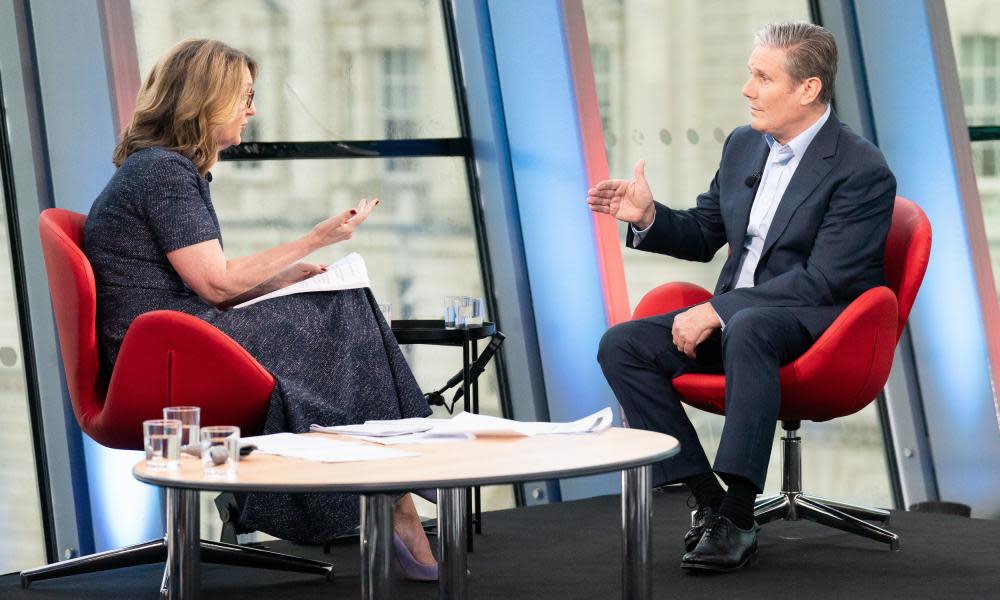Labour sets target of 1.5m new homes over five years

Keir Starmer has said the UK must “get real about where we’re going to build” to solve the housing crisis, as Labour pledged to review rules about building on the green belt.
Speaking to BBC One’s Sunday with Laura Kuenssberg at the start of Labour’s annual conference in Liverpool, Starmer said his party would set a target of 1.5m new homes over five years, and would strengthen guidance to ensure developers included sufficient affordable housing.
He contrasted this approach with Rishi Sunak’s decision last year to scrap national housebuilding targets following pressure from Conservative MPs. “We put the targets back up to get building happening. We have to challenge the planning laws, we have to get real about where we’re going to build and we have to work with developers to get there at speed,” Starmer said. “This can be done. But it will never be done by a government that simply takes down targets because the prime minister is too weak to stand up to his own party.”
While the Labour leader was not explicit about changes to where building could happen, it follows comments by Rachel Reeves, the shadow chancellor, who said Labour would speed up planning by reviewing rules about construction on green belt land.
Related: Angela Rayner accuses Tories of ‘taking a sledgehammer to’ affordable housing – UK politics live
“A brownfield-first approach is right,” she said in an interview with the Sunday Times. “But we also need to have a common sense approach, where we look again at what is designated green [belt] and brown[field].”
Reeves, who will make her speech to the Labour conference on Monday, told the paper that the planning process could be speeded up by giving local people benefits when housebuilding took place in their area, for example new schools or health infrastructure.
There would be no wholesale building on the green belt, she said. “We’re not talking about turning the beautiful countryside into housing developments. What we’re talking about is a common sense approach where local authorities and local people can go ahead with development on areas that are ripe for development, while still protecting our natural environment.”
On affordable and social housing, Starmer said a Labour government would “work with local authorities who are the drivers of social housing” and ensure they had sufficient powers to guarantee developers deliver the promised numbers of social rent and affordable homes in what they built.
“What happens in practice is that developers say it is viable [to build a certain number of affordable homes] when they seek the permission in the first place, and then later on that the circumstances have changed and it’s no longer viable. We need to strengthen the guidance, strengthen the framework to ensure that that doesn’t happen.”
Starmer also vowed to scrap plans to forcibly remove asylum seekers to Rwanda even if the policy was deemed legal by the courts and such action reduced the number of unauthorised Channel crossings.
He said he was clear he would reverse the “hugely expensive” and “wrong” scheme, which he said would only ever affect a very small proportion of migrants crossing the Channel.
The supreme court will on Monday begin hearing the government’s appeal against the ruling that the policy is unlawful as ministers struggle to achieve Rishi Sunak’s pledge to “stop the boats”.
Elsewhere in his BBC interview, Starmer refused three times to say whether he would be able to spend any more money on public services than the Conservatives if there was not economic growth, saying only: “I‘m confident we can get the growth.”
Starmer said a resurgence in growth could begin very quickly, arguing that businesses were wary of investing amid the turmoil of Sunak’s government. “We think that this can happen very quickly – within months of a Labour government we can turn this around and get the investment that we need,” he said.
“What businesses say to me is they need stability. There are plenty of investors who are absolutely clear in their discussions with me. They say, we will invest in the UK if the circumstances are right. But at the moment, because of this government with all the chopping and changing and chaos, they’re holding off for investment. We have to create the conditions for the growth in this country.”

 Yahoo News
Yahoo News 
